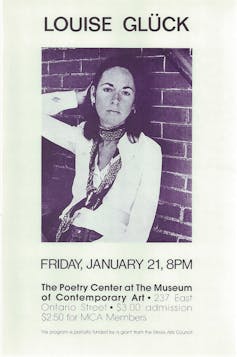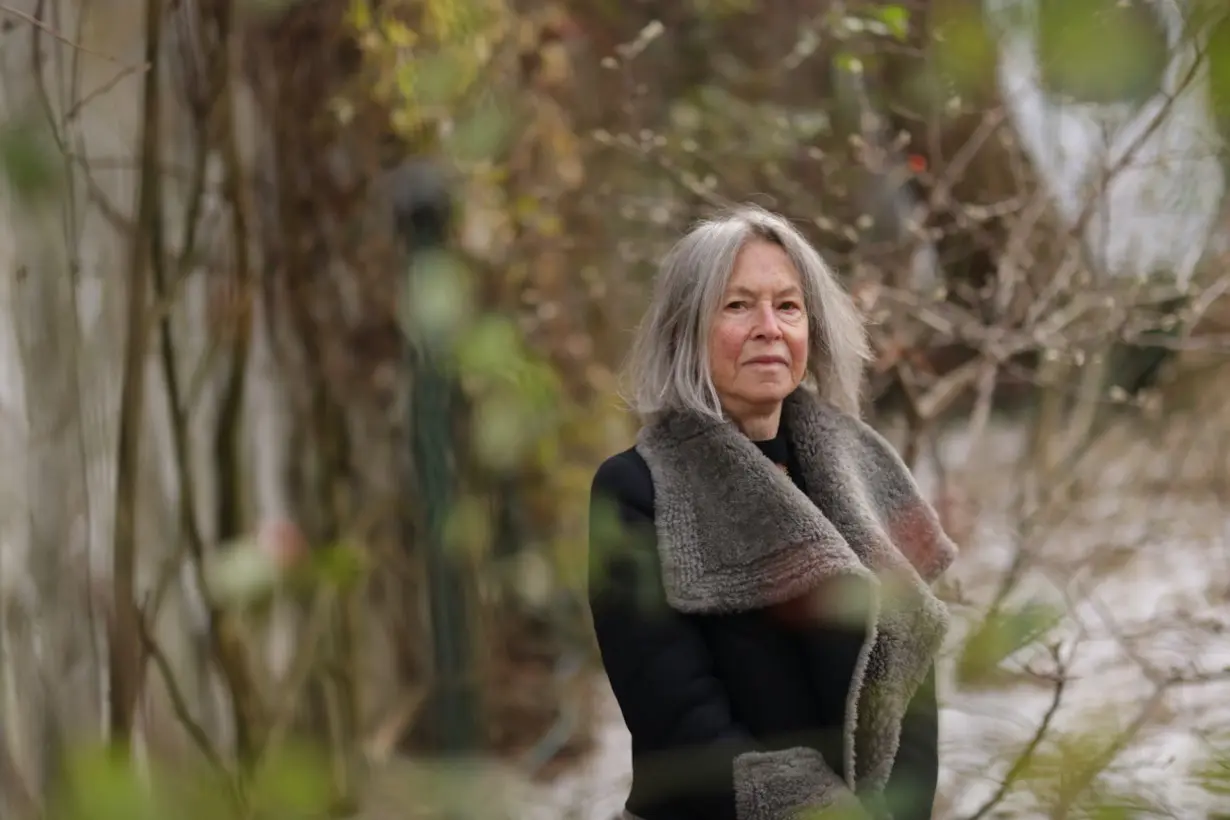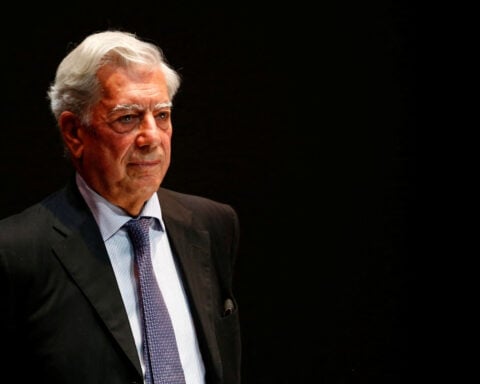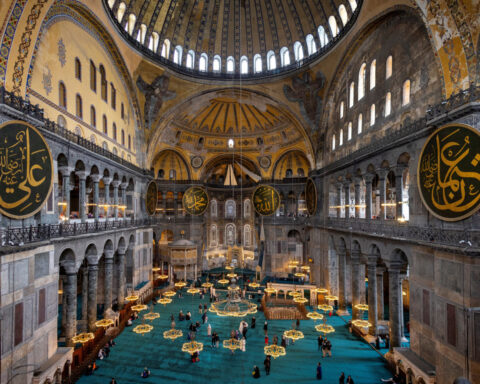When asked what her response was to being awarded the Nobel Prize in literature in 2020, Louise Glück replied that she was “completely flabbergasted.” She said she had thought it “extremely unlikely that I would ever have this particular event to deal with in my life.”
Glück, who died on Oct. 13, 2023, at the age of 80, may have been taken aback that she was granted this exalted honor, the first American poet to win since T.S. Eliot in 1948. But her win was far less surprising to those who know and love her work, and who now mourn her loss.
The Nobel Committee for Literature selected Glück for this literary achievement to honor her “unmistakable poetic voice that with austere beauty makes individual existence universal.”
As a poet and professor of writing, I have long been an admirer of Glück’s spare and striking work. Her lyric voice still reverberates after her death, in part because of how consistently she turned her attention to questions of mortality.
A cruel clarity of vision
Glück said, in the same interview about her Nobel win, “I’ve written about death since I could write.” Her work turns again and again to the human story, those elemental facets of life that unite people. She went on to say, “I look for archetypal experience, and I assume that my struggles and joys are not unique.”
What’s common to humanity characterizes her work: Her focus on lasting themes of family and heartache and loss has earned her a wide audience and lasting acclaim. Before being awarded the Nobel Prize, Glück won the National Book Award for “Faithful and Virtuous Night” in 2014 and the Pulitzer Prize for “Wild Iris” in 1992, among other accolades.
Louise Glück reads selected poems.
Though well received, Glück’s work is not always inviting. It can have an icy abruptness; she often writes speakers who have a cruel clarity of vision. In her poem “Mock Orange” she writes:
It is not the moon, I tell you.
It is these flowers
lighting the yard.
I hate them.
I hate them as I hate sex
which she goes on to describe as “the low, humiliating / premise of union.” As the poem ends, her speaker asks, “How can I be content / when there is still / that odor in the world?”
The lyric “I,” the first-person speaker of Glück’s poems, is rarely content. Though Glück wrote in the voice of many characters and from many perspectives, woven throughout her work is a perspective that tends to find the world – and the self – wanting.
It may be surprising, then, how strongly readers have responded to her still, spare, often quietly devastating work. It attends to daily human struggles as if from a distance, what the critic Helen Vendler described as “almost through the wrong end of a telescope.” As in the old adage about what poetry can do, Glück made the familiar strange, which is perhaps what continues to draw readers to her work: It renders the close-up experiences of heartbreak and hope from a new perspective.
Ancient voices speaking to the everyday
Glück also made the strange familiar, especially the distant world of myth. She brought ancient figures down to a human level by exploring everyday dramas through their voices.

A poster promotes a Louise Glück reading at the Poetry Center of Chicago on Jan. 21, 1977.
She wrote often of families and the ways they fail each other, though slantingly, as when Glück explores strained dynamics between mothers and daughters via the Greek goddesses Demeter and Persephone. She makes vivid the challenges of marriage through the characters of Homer’s “Odyssey” in her 1996 book “Meadowlands.” A poem from that work, “Telemachus’ Detachment,” envisages the son of Odysseus and Penelope reflecting on his parents’ union as “heartbreaking, but also / insane. Also / very funny.” Her register was wide: Though Glück wrote with a kind of detachment about even the most intimate of emotions, it was often via characters who spoke wryly, abruptly, with gallows humor and a gimlet eye for human frailty.
Failure and loss frequently gave rise to her work: Her fifth book, “Ararat,” published in 1990, arose after her father’s death; her 1999 book, “Vita Nova,” emerged from the dissolution of her marriage. Even her titles exemplify the dense literary references that characterize her work: “Ararat” echoes the story of Noah’s flood, and “Vita Nova” is named after Dante Alighieri’s poems on the death of his beloved. In “Vita Nova,” the way we fail those we love is explored via the myth of Orpheus and Eurydice.
Contact even at a distance
“Wild Iris,” one of Glück’s most honored works, winning both the Pulitzer Prize and The Poetry Society of America’s William Carlos Williams Award, is exemplary of her style. A book of poems written after a paralyzing period of writer’s block, it is the voice of flowers, of prayers, of the soul beyond death and of God speaking back through her poems. Even when talking to God, the speaker remains acerbic and questioning: The first line of one poem to God begins “Once, I believed in you … .”
The title piece of the collection speaks in the voice of a flower emerging in spring and as a speaker from beyond the grave, “whatever / returns from oblivion returns / to find a voice.” Another poem in the voice of “The Silver Lily” says “We have come too far together toward the end now / to fear the end.”
Louise Glück reads from ‘Faithful and Virtuous Night’.
Louise Glück’s poems can feel like they come at the drama of life from a distance: The voice in her poems has been described as vatic, divinatory, Delphic and haunting, evoking a ghost speaking across time, able to narrate its own story with a dispassionate disinterest.
In the end, it was this carefully crafted, piercing observation of what is core to our human struggle that continues to animate Glück’s work for so many. If ever a poetic voice was honed across a lifetime to speak to us from beyond the grave, it’s Glück’s.
This article was updated to clarify that Glück was the first American poet to win the Nobel Prize in literature since T.S. Eliot.

Amy Cannon does not work for, consult, own shares in or receive funding from any company or organization that would benefit from this article, and has disclosed no relevant affiliations beyond their academic appointment.
Source: The Conversation

 Trump has begun another trade war. Here's a timeline of how we got here
Trump has begun another trade war. Here's a timeline of how we got here
 Canada's leader laments lost friendship with US in town that sheltered stranded Americans after 9/11
Canada's leader laments lost friendship with US in town that sheltered stranded Americans after 9/11
 Chinese EV giant BYD's fourth-quarter profit leaps 73%
Chinese EV giant BYD's fourth-quarter profit leaps 73%
 You're an American in another land? Prepare to talk about the why and how of Trump 2.0
You're an American in another land? Prepare to talk about the why and how of Trump 2.0
 Chalk talk: Star power, top teams and No. 5 seeds headline the women's March Madness Sweet 16
Chalk talk: Star power, top teams and No. 5 seeds headline the women's March Madness Sweet 16
 Purdue returns to Sweet 16 with 76-62 win over McNeese in March Madness
Purdue returns to Sweet 16 with 76-62 win over McNeese in March Madness








